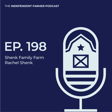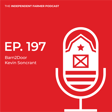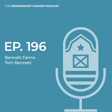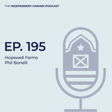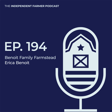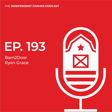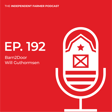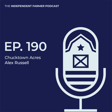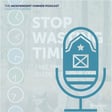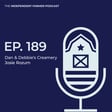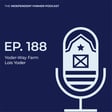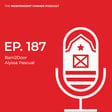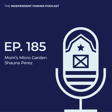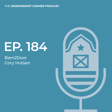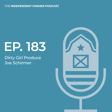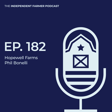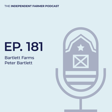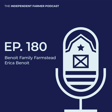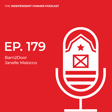Become a Creator today!Start creating today - Share your story with the world!
Start for free
00:00:00
00:00:01

Expanding your Farm Product with Value-Add Items
In this week’s episode, Ryan speaks with Joe of Dirty Girl Produce (CA) to break down how to expand your product to increase sales. Joe created canned items, preserves and juices to use harder-to-sell items, and stock his store with exclusive products.
For more Farm resources, visit: barn2door.com/resources
Transcript
Introduction to the Podcast
00:00:10
Speaker
Hello and welcome to the Independent Farmer podcast, the go-to podcast for do-it-yourself farmers who are taking control of their own business, skipping the middleman, and selling direct to local consumer and wholesale buyers.
00:00:20
Speaker
This podcast is hosted by Barn to Door, the number one business tool for independent farmers to manage their business, promote their brand, and sell online and in person. Let's dive in to today's Independent Farmer podcast.
Meet Joe from Dirty Girl Produce
00:00:42
Speaker
Welcome to the Independent Farmer Podcast. I'm Ryan. I'm on the success team here at Barn to Door and your host for today's episode. On the success team, we work closely with farmers, just like Joe here, on a day-to-day basis, giving them resources and best practices to help them achieve their business goals.
00:00:58
Speaker
As many of our listeners may be aware, Barn to Door offers an all-in-one business solution for independent farmers who are cutting out the middleman, taking control of their business, selling under their brand and making sure their customers can purchase from their farm, both online and in-person.
00:01:14
Speaker
In today's conversation, we'll get into expanding your product with value-added items. Joe of Dirty Girl Produce in Santa Cruz, California. Joe is a part of our farm advisory network and has worked with us for over five years and has since become an advisor and has brought insights running successful wholesale and retail produce business.
00:01:32
Speaker
I'm excited to talk to Joe about expanding his product value added items such as jams, preserves, and more. Welcome Joe. Thanks for making the time here with us today. Now I know you've been on our podcast before previously, but for those who are listening the first time, give us a little bit about your background and what got you into working over at Dirty Girl.
Joe's Journey in Organic Farming
00:01:53
Speaker
Sure, I started farming when I was in college, halfway through 93, 94. ninety three ninety four and then when I finished up, I was totally hooked on organic farming, small scale, sustainable farms of all kinds. And so I started traveling around, working for people, and then ended up working for my two good friends and mentors who really got me started in farming. Showed me how cool it was, Jane and Allie, the Dirty Girls. They started their business, and for two years, they ran it just themselves.
00:02:23
Speaker
And in the third and fourth year, I joined them and then they were ready to move on. So I just kept farming as dirty girl produce. And that was in 99, I think they left. So it's been since then, i think we need to have, we should have had like a 25th anniversary or 30th, I think something like that. But yeah, that's what we're doing. And we just grow all kinds of real crop veggies, strawberries, tomatoes, all kinds of normal little carrots, that kind of thing.
00:02:51
Speaker
Gotcha. That's awesome. i mean, it's been a blast getting to to work with Young Connect and hear the ways that you've encouraged some of our farms with your story and the lessons you've learned
Benefits of Value-Added Products
00:03:00
Speaker
along the way. So looking at today's topic and expanding your products, what led you into or encouraged you into adding those value added items?
00:03:10
Speaker
Well, the value added is, yeah i think it's twofold. One is the idea that you can elevate the amount of net profit you get on something you grow by preserving it, right?
00:03:25
Speaker
So there's that. There's also, when you run a farm, you know that I'm going to plan for getting 500 pounds of tomatoes from just making this up per week throughout the growing season, but it never works that way. It's like you have 300 and then 400 and then you have 5,000 pounds one week, you know, so you always have overproduction and underproduction that you're dealing with.
00:03:47
Speaker
And if there's some way to hold onto the value of your produce, that is more than you can just kind of sell, you know, because production, for me at least, I see a lot of bell curves. And when you have too much production and not enough demand to sell right on the spot, what are you going to do with that? A lot of farmers, what we have to do is we just have to turn that stuff back into the soil or feed it to our pigs, goats, chickens, whatever we're going to do, right? Make compost.
00:04:15
Speaker
And we do a lot of that anyway. There's a lot of waste. There's a lot of stuff that we can't sell. But value added allows you to retain some of that value that you've put in and you've yielded and you can sell it later.
00:04:28
Speaker
So I think all of those things kind of hitting you as a farm, you'll naturally question like, oh my God, what do do with all these tomatoes? And what do I do with all these strawberries? And that's what has always hit me.
00:04:39
Speaker
And so I just kind of seek out different ways of over the years, you know, how we can preserve stuff like dried stuff. You can put stuff in vinegar, you can heat it up and get a certain acidity and jar it, you know, so we do whatever we can really.
00:04:53
Speaker
Yeah, no, I know you've been at it for a long time, but some of these farms that are just getting into this, especially in the produce world, how do you go about planning that out and figuring out what's going to work as a value added item down the road?
Starting Small with Value-Added Products
00:05:06
Speaker
Yeah, well, that's a good question. I think you have to just chip into it. If you go too crazy put too much of your cash reserves into glass,
00:05:20
Speaker
maybe co-packing fees if you're having someone else do it. You can really spend a lot of money and you can essentially spend half the money that you're gonna get back selling the stuff retail into the preservation of the stuff. So i think you know people should be careful. It's always good to be able to do it all yourself at first and test and see then what people are gonna buy.
00:05:43
Speaker
If you do something that's too weird and turns out you don't have anybody to buy it later on, you're not producing a product that people want, then it's another way in farming you can lose money, right?
00:05:54
Speaker
And our goal here is to make more money and to not lose money. So value added, I say start small. figure out what people like and then do what people like. You know, for example, we do a lot of different tomato products because one of the problems with the tomatoes we do here in Santa Cruz County, we do a dry farm tomato, which means we don't water them. And so they get really stressed. They're really high acid, high sugar. They're really very delicious tomatoes, but they have a lot of blossom end rot, which we're trying to remarket as blossom end sparkle.
00:06:29
Speaker
But what happens is we get a lot of cosmetically flawed fruit and, you know, what are we going to do with it? We can sell a lot of it, but it's really the best fruit to preserve. So we do all kinds of different recipes and from just quartered and crushed tomatoes to sauces and see what people like. And really people we found really like the most basic of recipes you know a quartered crushed tomato or a blended tomato simple and then they can do what they want we've made like pasta sauce and different kind of thing we've made tomato waters we've made tomato juice we've spicy tomato we've done a clamato version that we call
Pricing Strategies and Market Challenges
00:07:11
Speaker
squid motto with california pacific squid instead of fish sauce we're at our clamato in mexico it's pretty weird but it's fun and but you know not super popular
00:07:20
Speaker
So really the basics is what we've found that people want. We also do strawberry jams and we've done like strawberry varietals that are specific varietal strawberries and then it's almost too much information.
00:07:35
Speaker
For people, they want a basic strawberry jam, you know. So we're trying to hone into it and we try to come and get a good balance of how much money we feel like we can basically invest in glass, this is what I call it, you know, and sit on that, you know, because really we need those cash reserves all the time. We don't have a business that we can just have a lot of cash hanging around it goes out as soon as we get it so so to put the money into our value-added products we really need to be very conscious of it and we have had one year where we had the ah usda value-added grant i think it was for man i think it was 80 grand and so they basically paid us back and so we put like 100 grand into value-added products
00:08:22
Speaker
And we actually did that in 2019, right before COVID. And so it just happened that we had a 40-foot container filled with freaking jars. It was crazy. And I really thought like, oh my God, we've completely overproduced here.
00:08:37
Speaker
And of course I had to put all the money in, but I got it paid back, which was cool. But then COVID came and everybody bought, we sold out. And I don't think we could sell that much retail, you know, as we did during COVID, it was crazy.
00:08:48
Speaker
So, you know, now we've kind of dialed back down as we have to be the ones that are just putting all the money up front, you know, to put like 60 grand in and try and sell it over the winter and into the spring.
00:08:59
Speaker
We have a hard time producing as much preserved items as we can, for example, like tomatoes. that we can sell them all year round. We end up selling out, right?
00:09:10
Speaker
And we could do more. But in order to do more, you got to put more money in. So really, I think like where we are, kitchen space is expensive. Land is expensive. I think we have some of the most expensive ag land in the country here, as well as, you know, the square footage. I think there's a lot of people that probably have a little more affordable square footage in kitchen space.
00:09:29
Speaker
You can get commercial kitchen rentals, or even if you can do it on your own farm. I think that's awesome. I know people that have that, and it and I think it works really well. And it's one of our dreams. But you really got to look at all the costs of everything and try to dial it down and not invest too heavy at first. Figure out what's going to work, right?
00:09:49
Speaker
But cast the net wide. Yeah, you bring up a good point when we're looking at all the expenses and that upfront investment that helps for the long term, right? But how do you determine what items are like the demand that's coming in from your customers, the feedback, how are you getting that feedback and how is it influencing your decision on what items you're going to move into that value add?
00:10:13
Speaker
Yeah, I mean, I think for every email, there's probably 20 other people that feel that way. So if people, you know, are verbal and tell me something, I listen. It's also, you know, the dollar is mighty when it comes to the influence of what we're doing. If someone sells it, if we sell it, then let's do it again.
00:10:32
Speaker
Right. So that's kind of what we've done. We've had a lot of different experiments and the products that sell is what we try to do. I always try to do like, okay, let's do something kind of cool and try it out and see if it works, you know, but really I don't try to go too big on anything that's new because I want to make sure that it sells.
00:10:53
Speaker
Do you have like a sample customer base that you kind of go to as your reference sheet for if you're starting a new product, you can sample it out to these VIP customers first. How does that work? Yeah, well, you know, we have really established farmers markets that we've been doing for over 25 years, um I think 30 years now.
00:11:12
Speaker
So that's always really a good place to try out anything new because there's not a lot of consequence and just presenting something, you know, and then talking about it and see how people react.
00:11:23
Speaker
It's also great that now we're on the platform online so we can, you know, I just, for example, this year for the first time ever, because we have so many trial varieties that I i have a tomato breeding program that I'm doing. I'm trying to get new lines developed. And so we have a tomato box that's a mixed box. We just put that on mixed box, five and 10 pound.
00:11:41
Speaker
And it's nice. you need You can just throw it on a store and see if your existing customers want it. And it's been selling. So it's like, cool. So I think you know having some sort of a stage, whether it's in person or online, to try stuff, put it in a newsletter, put it in an online store, or on your brick and mortar, or at your roadside stand, all those things. are really important to see what people want. and And of course, we have a bunch of stores that we deal with as well. So we do a lot of shipping and we have brand awareness. So whenever we have a new product we're working on, I can kind of reach out to people that are, they're already buying one thing from us and maybe they'll buy another thing. So, but you got to knock on doors, make phone calls for sure.
Co-Packing and Barter Relationships
00:12:28
Speaker
Yeah.
00:12:29
Speaker
Now bringing in new products also brings in a whole other variety things to start thinking about. i think one of the more common questions I get in our role as success managers is what should I price my products at? Like how do I price these effectively? So when you're bringing in a new item, how are you factoring that in? How do you figure out pricing for those?
00:12:47
Speaker
Right. Yeah, that's super tricky. and first thing you got to do is you got to cast your net wide and you've got to look at all the stores, all the other farms, all the other like products and figure out where you are going to fit into all that stuff. Are you better than them all? And so you can...
00:13:05
Speaker
ask for a bigger price. Are you underneath them and you need to get rid of this stuff so you're going to undersell? You know, it's kind of where do you want to find yourself in the price range? Right. And so usually what I do is I try to, you know, it's nothing like selling full retail on a product like, you know, we're talking about tomatoes here, but it could be a lot of different things. Right. But the price per pound on tomatoes, we're selling tomatoes at six dollars a pound right now. Retail you get five pounds. It's still thirty dollar box.
00:13:35
Speaker
20, we're selling at 80. And then of course we're shipping pallets, you know, so that's like, it goes from $6 a pound to $4 a pound. When we're shipping pallets across the country to Detroit, or we're going up to Portland, Oregon, to our stores, you know, we come down to like 250.
00:13:51
Speaker
two fifty a pound, right? So I have to consider, well, what is the product that I have and what do I want to get per pound off of this fruit, right?
00:14:03
Speaker
So you have to do that. So a lot of things, what do we do? A lot of times we have off grade and off grade boxes. so What are we going to sell that for? A lot of times, you know just because it's cosmetically flawed, it still costs you just as much money to grow it as it does the A grade. right So you really have to take that into consideration. And you can't just give it away. right So what we do is we try to calculate, okay, like a $50 box, 20 pound box, you know, $2.50 a pound.
00:14:32
Speaker
How can I retain that $50 box? So I calculate what's the cost of the co-packing? What does it cost to make the label? What does it cost to pick up and deliver all this stuff? I mean, there's a lot of storage, you know, like we have one place that sometimes we'll store everything.
00:14:49
Speaker
our product on app palletized jars and stuff like that you know there's a lot of different kinds of costs that you need to scratch it all out and figure out what it is that you need to get out of it and what you can get out of it and i'll find that like when we retail value added that's some of the best price per pound we're going to get on any of our fruit Right? I start with $6 a pound full retail.
00:15:13
Speaker
We're going to get eight or 10 a pound if we do everything right and we sell it by the jar, single jar at full price off the table. Right? And that's great. But then i also realized like the reality is that there are times in the week where I've got 80 cases I've got to get rid of. I'm either going to feed them to the pigs or I'm going to send them to a co-packer, right? And when I send them the co-packer and they come back, that 80 cases might be 80 cases of jars, you know, 12 each per case.
00:15:45
Speaker
And I can't sell that much retail. right So yeah I'm going to have to take half of that and sell to stores and they're going to only be able to, you know they've got to make their profit as well.
00:15:56
Speaker
So I'll try to cut that price per pound in half and essentially figure out what, you know I've seen our jars, which is 16 ounce tomatoes in stores buy right for $16 jar.
00:16:10
Speaker
right We sell them for 12. You can find a 16 ounce jar of tomatoes preserved for like five or six or something. You know, i mean, we come in way above, but we've got a store, we've got a better product, you know, we go for it. So you got balance all that stuff. You got to figure out what a store, if you're going to wholesale ah value added product, that's a whole nother can of worms. And it's pretty tough.
00:16:35
Speaker
to make any money doing it. But sometimes, like I said, we just need to recoup our cost. We have to say, hey, this stuff's either going you know to compost pile or it's going here. And if you average it all out and say, how much am I making from this stack of 80 cases and calculate, you just got to keep crunching those numbers and figure out what you can do. Also, sometimes it helps if you're trying to get into a store to meet them at a price that they can't afford so that they like your product customers want it and then later you can say hey i got to raise my prices so sometimes it's worth getting into an account and you know then being able to have a discussion with people and charging for it so Pricing is super tricky. You got to charge people and the smaller, the better, because if you're sitting on a huge inventory, you're going to be faced with the idea of having to stoke everybody out with Christmas presents or, you know what I mean? Like donating stuff. You get, there's a lot of, you know, you donate it to a 501 C three and you get a tax write-up if a tax write-up can benefit you.
00:17:39
Speaker
You know, I mean, there's a lot of different ways of working it, but I think that another way of pricing that I think can be factored into this is how you're going to co-pack, right? Co-pack meaning someone else is packing for it. Now, if it's you doing it,
00:17:56
Speaker
then you gotta figure out what's the cost of you doing it? What do you need to get back? Is it you personally doing it? Are you paying someone's wage? Are you paying for a commercial kitchen, right? All that kind of stuff. Or what I have a lot, i have a lot of relationships with other farms and other businesses where they preserve food, right?
00:18:14
Speaker
And I've got two this year that I'm working with. And funny, right before this, I was getting on the text chain back and forth with one of these businesses, right? Saying, hey, I don't have the dollars to just invest You know, pay for 10,000 pounds of tomatoes that I know I could sell if they were preserved. You know, I know I could sell it. That's no problem, but I don't want to write that check.
00:18:35
Speaker
So we're going back and forth and she has a whole business. And so we're going to work on a whole deal where I'm basically paying her with product. So I'm going to give her tomatoes. She's going to make her product that she makes.
00:18:47
Speaker
And we're going to keep a tab on that end. And then she's going to give me jars on my end. And we're going to keep tabs that in the end of the year, we're going to settle up. I've got another person that I deal with. Same thing. Does a lot of pickling, does a lot of beans. And I'll tell you, green beans are harder and harder, especially in California, because they're so labor intensive.
00:19:07
Speaker
And we still do beans because we can for some crazy reason. And so we do really good green beans. We have French beans. We have Romano's, Yellow Axe, all these really specialty green beans. And so we're going to basically be giving him all these products, green beans, strawberries, tomatoes, all these things. He's going to make his products. We're going to keep a tab and he's going to return by doing value added on the stuff that we most need to get value added.
00:19:33
Speaker
That, hey, I'm swimming this week in this. Can you do this? And he's like, yeah, let's go. You know, so these are relationships that I've built. I've got another one that's a farm that has a drying process. They're in the California Central Valley where we are in Santa Cruz County.
00:19:48
Speaker
It's wet and drippy and foggy right now. It's terrible. And you can't sun dry stuff. You'll get mildew. This guy dries stuff. i give him I gave him 20 flats of strawberries last Saturday.
00:20:01
Speaker
And this Saturday, when I see him at the farmer's market, he's going to give me half. And that's generally has been good as far as pricing. If you give someone one a hundred pounds of something, expect the 50 pounds, half of it coming back to you, they can keep it. You got to negotiate that.
00:20:20
Speaker
People will see whether that's fair. Maybe you got to 40, 60 or 60, 40, depending on who's doing it, you know, but you got to really cover those co-packing costs.
00:20:31
Speaker
And there's a lot of relationships you can develop with people that want to do co-packing for you that'll take it in trade, which is a lot of time. Much better deal for a farmer because you're sitting there with a surplus and you don't have the cash.
00:20:46
Speaker
And hey, I'd much rather pay in product than pay in cash, right?
Building a Farm Business Steadily
00:20:51
Speaker
Absolutely. i love that you brought that point up. It's one of the things that I'm always encouraging the farms I'm working with to look for some of those partnership opportunities to identify because you have products, you have things that you can offer if you don't have that cash flow on hand right away. Because we deal with a lot of farms, big and small.
00:21:08
Speaker
And now looking at some of those farms, maybe on the smaller side, just getting into produce, ah just getting started in this, what would be some of the things you would recommend for them for moving product and managing their product?
00:21:20
Speaker
Yeah, well, I think that based on my experience, there's nothing better than time and like season after season after season. You know, building your customers and your products over seasons. You know, you give it one year, you hopefully you have some downtime where you can really think about it. And when you're planning for the next year, plan according to what happened the previous year and what angles you think you can improve on and stuff like that.
00:21:43
Speaker
So it's really hard to adjust mid-season. Once you've already sown the stuff in the greenhouse, planted it out, and you're yielding, it's hard to change your plan. You just got to kind of roll with it, right? And unfortunately, sometimes I'd say it's better in the long run to just disk in product that's in the field that you can't sell rather than make it worse.
00:22:04
Speaker
When you overproduce, sometimes you just got to suck it up and it hurts, but you got to do it. If you have a plan in place, I think it's great. Go for it.
00:22:15
Speaker
You already have the glass. But if you're staring at cases of product that's already picked and just sitting there and you've got to figure out where to buy glass jars or whatever, you got to figure out, you know, I got to get copper pots. It's almost too late.
00:22:31
Speaker
It's almost too late. Right. You got to plan this all out. So there's nothing like building season after season after season. You know, that said, come up with a good plan.
00:22:44
Speaker
Get all your stuff in the off season ready, right? So you're ready to go, especially when it comes to value added. You want to be ready to go. And like we have, you know, I have copper pots on our walls in our kitchen at home because we've trialed a lot of jam. My wife used to make this most incredible strawberry jam. She actually went and took a course with this, you know, jam maker and figured out how to do like the bomb.
00:23:10
Speaker
jam that's hard to do commercially, right? You're taking a good product, you're elevating it, making it even better. So when people try it, they're trying the best strawberry jam they've ever had in their life. You know what i mean?
00:23:22
Speaker
So I think really just having that plan and I mean, man, it's hard to change course once your year, like God, it's August, mid August right now. It's so hard to change course right now or try something new right now.
00:23:36
Speaker
We are so overburdened with what we've already gotten ourselves into. So, you know, downtime is everything. Downtime is when we catch our breath, where we revise our business plan, when we order seed, when we plan on new livestock or whatever it is we're doing, you know, see if we can get equipment, see if we can get credit lines and loans and relationships with customers, how we're going to attack the next season.
00:24:03
Speaker
so yeah i think really time is the best thing and to go slow with everything don't go too big and just invest in things that you feel like it's not just a good idea because you probably have a lot of good ideas but they have to be someone else's good idea and that other person has to be your customer right so you have to meet people and they have to understand what it is you're doing.
00:24:30
Speaker
So I think everything comes up together with the product, PR, marketing, your customers, everything gets built slowly over time. I think you can launch in and have a really good plan. But like I said, it's hard to switch gears once the season is already fully rolling.
00:24:48
Speaker
Yeah. How far ahead do you start planning out your year? And I know obviously with your yields, you have a good idea of when those are going to be happening, but how far do you start planning some of this stuff out?
00:25:00
Speaker
Well, you know, like I said, some of the things are just year after year, right? You build off of what you're already doing. So now that we're like all online and organized, I have spreadsheets for our crop plans. We grow veggies, right? They all start from seed or crowns.
00:25:15
Speaker
and we have a direct sown spreadsheet that's all our direct sown raw seed that goes into the ground and then we have one spreadsheet that's everything that goes in the greenhouse right of course we grow strawberries which would buy crowns from a producer but we have it all spelled out and so we have 2024 and i copy and paste that thing for 2025 and i just go week by week and figure out when i'm gonna dial it and i change everything based on what my experience is i try to follow that record of how all the sewings went how all the yields went how all the sales went and i try to adjust it every year you know tweak those knobs slightly and every single number the way that i look at as every single number that i put in 2025
00:26:00
Speaker
For a sowing date, say example, May 15th has a sowing date. And I have a number of everything I'm sowing. Every single one of those items, carrots, beets, whatever, every one of those numbers can be tweaked either up or down.
00:26:14
Speaker
Maybe you see a number that's perfect and you don't change it. Okay, that's possible. But in the reality, I always feel like it can be up or down slightly. So I just try to go meticulously through and change everything based on that and adjust my crop plan based on what the previous season is and what I expect the next season to be. Maybe I want to Totally downsize. Maybe I want to invest bigger in something. Maybe, you know, who knows what ideas I have when it comes to value added. It's tricky because, you know, dirty girl produce has outlived like four co-packers that we've used in the past. You know, people that have popped up, love small farms, want to be this business that takes all this surplus produce and turns it into this product, puts it in the stores and they fold it.
00:27:01
Speaker
Or given up or transitioned into something else. So we still have a couple of people that we really deal with one in particular that we've been with all along and they've outlasted everybody in whatever sphere of business, marketing, whatever they do.
00:27:17
Speaker
value added, but a lot of people pop up and go. And so we are constantly looking for co-packers. We're constantly looking for new people that have ideas. People come up, but a lot of times, you know, until they're tried and true, but you don't know how much you can rely on people. And when it comes to the all the value added stuff, this is stuff that is produce that is fresh produce of some sort. And what you're trying to do is you're trying to preserve it so it doesn't go bad.
00:27:46
Speaker
So you can eat it later, right? And I'll tell you from personal experience, That's not easy. You can dry stuff and then open the thing and it's moldy. You can have beans and dry beans and you open your bag of beans and there's bean weevils crawling in It's terrible. You can get lids that pop and fermenting bad preserved tomatoes or jam or you name it, you know, things can go wrong. So you really do need to do a good job when it comes to value added stuff. A lot of it is really like really old technology that you just need to, you know, follow down your list and do everything and heat it up to the right percentage, to put the right amount of salt, cure it the right way, do it all right, and it'll go. But
00:28:32
Speaker
People with the best intentions, you know, you can really lose stuff. So you really need to have a good plan and have a trusted partner when it comes to people taking your produce and what they're going to do with it.
00:28:46
Speaker
If it's not yourself. Absolutely. Yeah. And it sounds like you'd spend a fair bit of time on the research and development side when it comes to bringing in new products. Some of those taste testings sound like they're pretty fun for you. can Try out all those different jams that your wife's making.
00:29:01
Speaker
But how much time you spend in the kitchen working some of those ingredients out and figuring out what's going to be a great value add? Yeah, well, not much to be honest. I mean, I've done a lot of it, but I trust people that are better than me at doing that.
00:29:15
Speaker
Right. I mean, there's people that do this. I don't have a canner's license here in order to sell in a store, you have to a canner's license, which basically you go through a class, you learn all the stuff and you're certified, right? So a co-packer is certified. In what we do, now if you do small scale and you just send to your retail customers or you send to a farmer's market here, there's a Cottage Food Act, I think it's called something like that, you can do a certain amount in your own kitchen. But I really trust people that do this for a living.
00:29:45
Speaker
to do it because a lot of the volume and stuff, I mean, I definitely have ambition of doing this ourselves and I'd like to, but it's always more complicated than you think.
00:29:55
Speaker
What if I invest in a big kitchen and I do all this stuff and I make all this stuff and then the jars start popping anyway. And I'm like, oh my God, you know, because this happens. So yeah, I've had fun. The most fun I've had is probably, I spent a lot of time on the beach in Mexico.
00:30:13
Speaker
surfing, drinking beers. A beer that you drink in Mexico is called calamada or michelada mix. And I've always seen that. It's very weird, you know, for a lot of people that you add like basically a tomato juice. It's a clam tomato juice.
00:30:29
Speaker
And so I wanted to repeat that. and figure out how do we make, because Nestle actually owns the branding Clamato, right? A Michelada is a drink. Clamato is something you buy in a store and it's terrible. It's probably in like 7-Eleven or whatever, you know, and it's lot of preservatives, a lot of junk, and it's got a little bit of clam broth and a little bit of tomato juice.
00:30:53
Speaker
and a lot of salt and celery juice, whatever. So we had this whole big party where we were basically cooking up tomatoes and mixing with um different fish sauce that we come up with and clam broth. We made clam broth, which are really fun.
00:31:05
Speaker
So that was really fun because we're trying to make something, you know, like a Bloody Mary mix, Michelada mix, and everything in between, you know. And so that's fun. We had a fun party one time.
00:31:16
Speaker
I think it's way back in our social media. If you look at Squid Motto on our Instagram stories, I think you can go back if you go. That's pretty fun. But really, you know, i mostly trust other people.
00:31:28
Speaker
And I've really found that the most sellable product is the basic product. It's not the weird product. Like if it's tomato, you just do as basic as you can and then people make their own thing.
00:31:41
Speaker
Some people, yeah, they want a specific pasta sauce ready to open and throw on. That sells a little bit, but nothing, that doesn't sell as much as just the basic preserved tomato, whether it's a crushed tomato or a blended tomato.
00:31:53
Speaker
Same with strawberry jam, just do a basic strawberry jam. the standard half-weight sugared jam. When you make strawberry jam, you're like, God, this has a lot of sugar in it.
00:32:04
Speaker
But it's the basic jam. Everybody loves it. You start doing lower sugar or different twists, or you put pepper in there, or people do all kinds of weird stuff with jams. It's neat, but the basic is good to stick with, you know.
00:32:17
Speaker
So yeah, I trust other people. Yeah. Yeah, man. So just a good business model. You don't have to be the expert in every area. there's somebody who's already great at it, just partner with them. So now for marketing those items, so reminding people who are ordering from you regularly, maybe they're bought into your CSA or your delivery. How do you remind those customers that you have these new value items?
Marketing and Customer Engagement
00:32:39
Speaker
Yeah, that's a good question. So one of the great things that we do now that we are online and using Barn-to-Door and using MailChimp for our newsletters is we send out to newsletters every week. We have a wholesale one to all of our restaurants and stores.
00:32:57
Speaker
and then one that's a retail newsletter. And we can give farm updates and different things, what's going in farm. But really, we use it mostly to just update, let people know what products we have. So when we're about to send a whole bunch of strawberries and tomatoes to get preserved this Sunday,
00:33:17
Speaker
And so when we get back, our MailChimp, our newsletter is going to be, you know, bomb. We're going to take a fresh photo. We're going to say, look at what just came in. It's a great opportunity to let everybody know when something just comes, in even if it's a value added, you know, the idea of value added is you're not in a hurry to sell it. Right.
00:33:35
Speaker
Sell your fresh stuff and chip away at this stuff. But the reality is people really once you start selling value added stuff, people really want to know when it comes back in right away they want to buy it right away they're excited about it so that's one thing about having a newsletter is that we let people know as soon as we have our value-added products you know we're going to have a bunch of dried strawberries coming on saturday that we'll bag up in the little bags and so and then we're going to have new strawberry jam because we already have some strawberry jam but this is going little different
00:34:10
Speaker
and then we're going to have our first tomato preserves are going to go crazy because we've been sold out for months now and everybody asks for it yeah what blows me away is i always thought when i first started preserving tomatoes that once our tomato season starts we want to be sold out of jars because no one wants to buy our jars when we have fresh tomatoes people want to buy preserved tomatoes year round As soon as you have them in the middle of the tomato see people could buy fresh tomatoes, but there's people, they want to buy the jars.
00:34:43
Speaker
They like it. They get used to it. Once they try something they like, they want to try it again. So it's really kind of cool because we go year round on tomato jars and they don't make it anymore.
00:34:56
Speaker
So we're going to sell out on this first batch of tomato preserves. They're basically pre-sold because there's all the stores that already want them. And there's all these customers that already want them that buy them by the case.
00:35:08
Speaker
So the first one is already sold, which is nice. And then after that, we're probably going to start, you know, filling up our shipping container and chiseling away at it. But it'll be interesting see this year because I don't know why. It just seems like every year once you build it, you know, the demand builds.
00:35:26
Speaker
And then you don't have something that people are used to and they start asking. So it'll be interesting to see what this year brings. Do you ever put together any bundles of some of these value add items where you have like an ultimate pantry bundle that has some of the tomatoes, the canned green beans and all of those in one item that they can buy?
00:35:46
Speaker
Yeah, especially during Thanksgiving and Christmas. You really got to get ready beforehand, but we were doing a lot of shipping for a while there. And one of our shipping items would be a mixed case and it'd have jam.
00:35:59
Speaker
It would have two different kinds of preserved tomatoes. We'd have tomato juice. We had a spicy tomato juice. We had our Michelada mix if people wanted. So we'll do any kind of combo and just see what people want, you know, see what sells.
00:36:13
Speaker
And that's why I think it's good. Farmer's market, we can kind of like put that together, put it out there and see what people want. Do like three different kind of configurations and see what people want to buy. It's good to have it pre-packaged with a nice little bags, nice little mixed boxes. We get Indestructo boxes, is that what they're called? Indestructos, which are shipping boxes, which are nice that people can give as gifts.
00:36:35
Speaker
That's always really useful. But yeah, we'll try any configuration of value-added items for people. And they seem to go pretty well. We sell the most of our basic preserved tomato. The most basic one is what sells the most, more than anything else.
00:36:51
Speaker
So we try to do that, but it's good to just try everything and see what works. you know We've ended up having a bunch of fill in our shelf with all the different configurations ready to get out and go on shipping or go straight to our retail pickups.
00:37:05
Speaker
And we've ended up unpacking some of our mix. When we sell out a regular, and you know, our mixed boxes will take out and because of those blended people want to buy or they want just jam or whatever.
00:37:16
Speaker
But it's good to try everything and be ready for Christmas because that's when people want to buy Christmas presents. Yeah, now I'll be ordering some of that spicy tomato juice you got from my dad. He loves that stuff.
00:37:27
Speaker
That's his go-to after mowing the lawn. Yeah. He'll be sending some his way. Last question I got for you today is just, what would be the advice you'd give to someone who's just getting started into looking into their value ads? If there's one piece of advice, and'd say you wish you knew this getting started, what would that be?
00:37:43
Speaker
Go slow. you know try Try everything, go slow, and then just invest money into what you know is gonna work and what you know people are gonna buy.
00:37:55
Speaker
Try not to invest too much in something you haven't sold yet. you know So pass the net wide, do a little bit of stuff. If something doesn't work, don't do it anymore. you know Don't try to...beating a dead horse is a terrible metaphor, but don't keep doing something that's not serving you. Put all your efforts in the things that you find work and there's interest.
00:38:18
Speaker
And if you're going to do value added, especially putting stuff in jars, Buy the glass, buy the stuff you need, but the pots, the cans, the whatever, all the infrastructure you're going to need to do it.
00:38:33
Speaker
Buy it way ahead of time. So you're just sitting on it. Because when it comes and you're going to be doing this stuff, it's going to be a lot of work. So you want to you want to limit it. So yeah, just go take it easy. Go slow.
00:38:46
Speaker
And nothing works better, I've found, than going building year after year on something and being able to change, tweak the knobs for the following year's crop plant.
00:38:59
Speaker
Awesome.
Conclusion and Resources
00:39:00
Speaker
Love it. Well, definitely want to extend my thanks to you, Joe, for joining me here today on our episode. You can always check out more for Joe and the farm on their Instagram at Dirty Girl Produce.
00:39:09
Speaker
Here at Barnador, we are humbled to support thousands of independent farmers across the country. We're delighted to offer services and tools to help farmers access more customers, increase their sales, and save time for their business.
00:39:22
Speaker
If you're an independent farmer who's just getting started or transitioning to selling direct, or if you've been at it a while and want to simplify your business management, please visit www.barnador.com backslash learn more.
00:39:35
Speaker
Thank you for tuning in today. We look forward to joining you on next time. on the Independent Farmer podcast.
00:39:50
Speaker
Thank you for joining us on the Independent Farmer Podcast. At Barn to Door, we are passionate about empowering independent farmers to build a thriving business. To all the farmers out there, thank you for all you do to grow amazing food, care for the soil, and serve your local communities.
00:40:05
Speaker
You are the backbone of our country. For free farm resources or to listen to prior podcasts, go to barntodore.com backslash resources. We hope you join us again and subscribe to the Independent Farmer Podcast wherever you stream your podcasts. Until next time.
